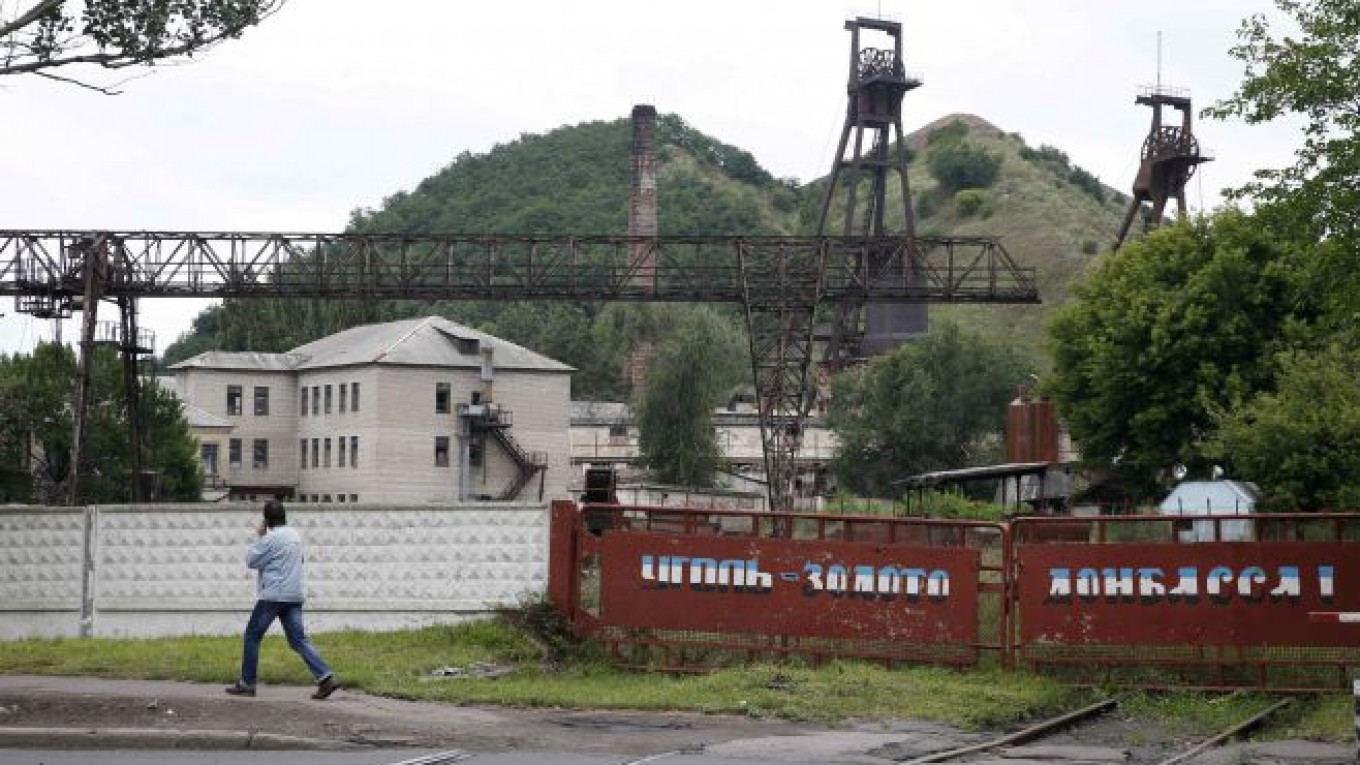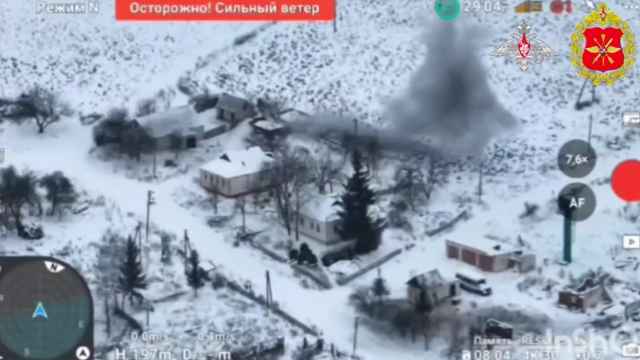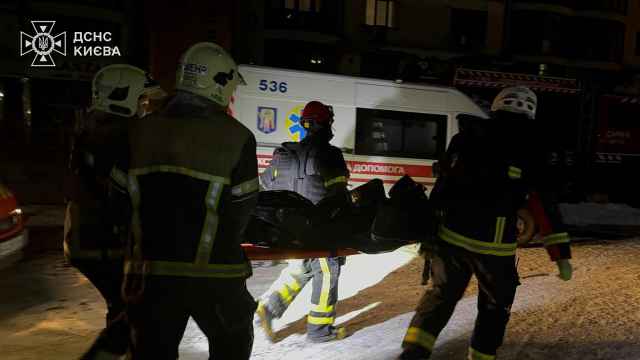KIEV/DONETSK, Ukraine — After pro-Russian rebels took 720 kilograms of explosives, 360 detonators and almost 1 kilometer of wiring, the Skochinskiy coal mine, an aging stalwart of the economy in Ukraine's Donbass region, was put out of action.
Fierce fighting and rebel requisitioning have stopped work at many of the coal mines in and around the strongholds of Donetsk and Luhansk. Without the fuel, nearby steel factories and electricity plants across Ukraine are struggling to work.
Many in Ukraine's western and central regions see the industrial east as a burden, home to an outdated Soviet economy of monolithic factories that offer little to the rest of a country where other sectors and smaller firms are more common.
But officials say with a budget unable to finance the Ukrainian army after losing revenues from Crimea, annexed by Moscow in March, Kiev not only needs the contributions from its east but also its heavy industry, albeit in a modernized form.
"There's a war in Donetsk and Luhansk and practically all revenue from these regions to the state budget has fallen. Plus they annexed Crimea," said Mikhailo Noniak, deputy minister for revenue and duties at Ukraine's tax agency.
"The reality of the financial situation is pretty bad at the moment because of Russia's aggression. A lot of money goes to defense," Noniak said.
Ukraine is virtually bankrupt, running wide external deficits and struggling to cover state wages, never mind feed and equip an army whose numbers have risen as fighting against rebels who want independence for the Donbass intensifies.
The International Monetary Fund has thrown a financial lifeline, stumping up $17.1 billion as part of a two-year bailout package. Kiev has received $3.2 billion so far and hopes to get an additional $1.4 billion in late August.
Oligarchs, who became wealthy in the chaos following the fall of the Soviet Union and own much of the country's private economy, have also stepped in, with one, Ihor Kolomoisky, financing and arming several battalions fighting the rebels.
But while financing from businessmen is unsustainable, Western funding demands that a reluctant Ukrainian parliament make some tough changes to its economy, where the state has long subsidized energy bills and has a bloated state sector.
Much of that budget spending goes to its east, especially Luhansk and Donetsk, impoverished regions where a flat panorama of pot-holed roads and grassy fields is punctuated by slag piles or mining machinery.
Eastern Drain
Donetsk contributed 11.7 percent, or 170.8 billion hryvnia ($14 billion), to Ukrainian gross domestic product last year and Luhansk contributed just over 4 percent, at 38.9 billion hryvnia ($3.3 billion).
But they swallowed more than 10 billion hryvnia ($850 million) from the budget in 2013, largely because of the high number of state workers in the mining and steel industries.
Now, those workers who have yet to flee the area are still paid despite largely not being able to mine.
"The majority of mines in the Donetsk region have stopped work because of a lack of explosives," said Mykola Volynets of the independent trade union for Ukrainian miners.
"The separatists came to the mines and just took the explosives and we do not have spare," he said.
Oleksander Vapnyk of the state's Donetsk coal energy company said his mines had been reduced to just two shifts because of a lack of explosives. "What will happen next, we just don't know. The mines are working, getting coal, but in smaller volumes."
Many workers have fled, but those who remain are trying to keep the mines safe, preventing flooding and doing maintenance. But with electricity often cut off by stray missiles or a lack of coal, such work is often impossible.
Some officials fear the lack of employment could fuel disillusionment in a region, which has lagged much of rest of the country, and spur more to join the rebel movement.
For the time being wages are being paid, said Dmytro Sakharuk of DTEK, the company of tycoon Rinat Akhmetov, Ukraine's richest man, who during the rule of pro-Russian President Viktor Yanukovych increased his holdings in coal.
His company now accounts for 48 percent of coal output and generates almost 30 percent of Ukraine's electricity, mostly from coal. Akhmetov, whose fortune is put at more than $11 billion by Forbes magazine, has about 300,000 employees on his payroll.
"Yesterday when the [electricity] lines were down … we brought out the miners, about 3,000 people, from our mines in the Luhansk region," he told Ukraine's 112 television, adding that they restored power in the evening and miners were preparing the shaft for the second shift.
"To restore the power supply we need peace."
Russian Pain
Without power to guide maintenance work, the mines may become flooded and machinery could seize, meaning it could take months or years to make them operational again.
Some officials argue that the demise of the mines and other coal-dependent heavy industry would not be such a bad thing as exports, such as steel, are dependent on Russian markets that are becoming increasingly closed to Ukrainian products.
President Vladimir Putin has made clear that if Ukraine pursues close trade and economic ties with the European Union, Moscow will respond with more restrictions and bans.
Exports to Russia accounted for nearly a quarter of Ukrainian external trade and contributed around 8 percent of GDP before the war. Thirteen percent of Ukraine's iron and steel exports used to go to the neighboring country.
Reorienting to the West would be a challenge for the east's economy, which is unable to compete on price or quality with Chinese steel after officials have been reluctant to plow any profit into upgrading or modernizing its plants.
"There are virtually no small and medium-sized businesses as a sector and that was done deliberately. It was more like a feudal system," said Daniel Bilack, an adviser to the governor of Donetsk, Serhiy Taruta.
He said Russia would hardly want the Donbass region with its inefficient, loss making mines. He said it is time to "bite the bullet and start building very efficient coal plants that will provide electricity and energy that Ukraine needs."
For that, Ukraine will need U.S., European and Japanese investors to come into the east and help rebuild roads, rail, building, bridges, airports and other infrastructure projects.
But that will mean a long road ahead.
"There will have to be a significant lifeline for a period of time," Bilack said. "But then how did Germany get started again after World War II?"
See also:
A Message from The Moscow Times:
Dear readers,
We are facing unprecedented challenges. Russia's Prosecutor General's Office has designated The Moscow Times as an "undesirable" organization, criminalizing our work and putting our staff at risk of prosecution. This follows our earlier unjust labeling as a "foreign agent."
These actions are direct attempts to silence independent journalism in Russia. The authorities claim our work "discredits the decisions of the Russian leadership." We see things differently: we strive to provide accurate, unbiased reporting on Russia.
We, the journalists of The Moscow Times, refuse to be silenced. But to continue our work, we need your help.
Your support, no matter how small, makes a world of difference. If you can, please support us monthly starting from just $2. It's quick to set up, and every contribution makes a significant impact.
By supporting The Moscow Times, you're defending open, independent journalism in the face of repression. Thank you for standing with us.
Remind me later.






